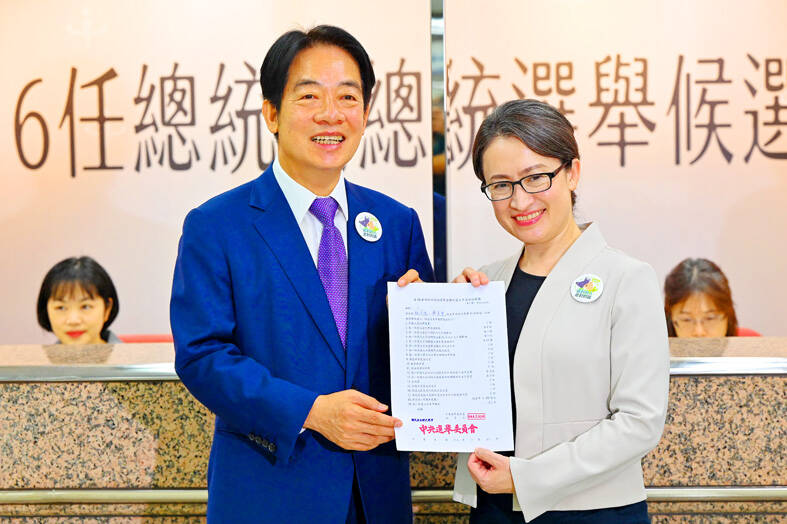Taiwanese have to make a choice in January’s presidential election between continuing on the road of democracy or “walking into the embrace of China,” Vice President William Lai (賴清德), the Democratic Progressive Party’s (DPP) presidential candidate, said yesterday.
After formally registering the candidacies of himself and his running mate, former representative to the US Hsiao Bi-khim (蕭美琴), with the Central Election Commission, Lai told reporters and supporters that Taiwan’s security is an international issue and the whole world would be watching the vote.
“The people of Taiwan have to choose between trusting Taiwan — allowing Taiwan to continue to move forward on the road of democracy — and relying on China, following the old path of the one-China principle and walking into the embrace of China,” he said.

Photo: AFP
He and Hsiao would continue to lead Taiwan on a stable path, seeking opportunities to engage with the international community while avoiding heavy reliance on China, Lai said.
“We are firmly resolved and fully confident,” he said. “We both deeply love this land and this country, and are committed to doing our utmost to safeguard Taiwan and promote democracy, peace and prosperity.”
The Lai-Hsiao pairing represents responsible and steady governance, as we have decades of experience as public servants, Lai said, adding that Taiwanese society could not afford turmoil, nor could it be used as a testing ground.
Lai was likely hitting back at Taiwan People’s Party (TPP) Chairman and presidential nominee Ko Wen-je (柯文哲), who last week said that a proposed coalition TPP-Chinese Nationalist Party (KMT) government would be an “experiment.”
Meanwhile, Time magazine yesterday published a feature on Lai, titled “Taiwan’s presidential frontrunner faces a balancing act with China.”
The DPP can “maintain Taiwan’s sovereignty without endorsing the fiction of reunification,” Lai was quoted as saying.
He also said he wanted to “expand Taiwan’s growing web of economic ties to make the island indispensable to the global economy.”
“For Lai, every Taiwanese investment abroad and foreign investment at home incrementally boosts the island’s security,” the article said.

Nipah virus infection is to be officially listed as a category 5 notifiable infectious disease in Taiwan in March, while clinical treatment guidelines are being formulated, the Centers for Disease Control (CDC) said yesterday. With Nipah infections being reported in other countries and considering its relatively high fatality rate, the centers on Jan. 16 announced that it would be listed as a notifiable infectious disease to bolster the nation’s systematic early warning system and increase public awareness, the CDC said. Bangladesh reported four fatal cases last year in separate districts, with three linked to raw date palm sap consumption, CDC Epidemic Intelligence

Two Taiwanese prosecutors were questioned by Chinese security personnel at their hotel during a trip to China’s Henan Province this month, the Mainland Affairs Council (MAC) said yesterday. The officers had personal information on the prosecutors, including “when they were assigned to their posts, their work locations and job titles,” MAC Deputy Minister and spokesman Liang Wen-chieh (梁文傑) said. On top of asking about their agencies and positions, the officers also questioned the prosecutors about the Cross-Strait Joint Crime-Fighting and Judicial Mutual Assistance Agreement, a pact that serves as the framework for Taiwan-China cooperation on combating crime and providing judicial assistance, Liang

Reports of Taiwanese going missing, being detained or interrogated, or having their personal liberties restricted in China increased about fourfold annually last year, the Mainland Affairs Council (MAC) said yesterday. Last year, 221 Taiwanese who traveled to China were reported missing, were detained and interrogated, or otherwise had their personal freedom restricted, up from 55 the previous year, the council said. Reopening group tours to China would be risky, as it would leave travelers with no way to seek help through official channels after Beijing shut down dialogue between the associations tasked with handling cross-strait tourism, the MAC said. Taipei’s Taiwan Strait Tourism

SHIFT: Taiwan is evolving from a transit stop into a tourist destination, with more international travelers willing to spend on tours, dining and cultural activities Taiwan rose three places in the World Tourism Barometer to 36th globally in 2024, with international tourism revenue of US$10.028 billion, the Tourism Administration said on Monday. The UN Tourism Organization publication said that its focus has switched from whether a country has returned to pre-COVID-19 levels of tourism to the amount spent by a tourist during an overseas trip. The nation last year welcomed 8.57 million international tourists, about 9 percent more than in 2024, with most tourists coming from Japan, South Korea, and Hong Kong and Macau, all of which accounted for at least 1 million tourists each. During the first